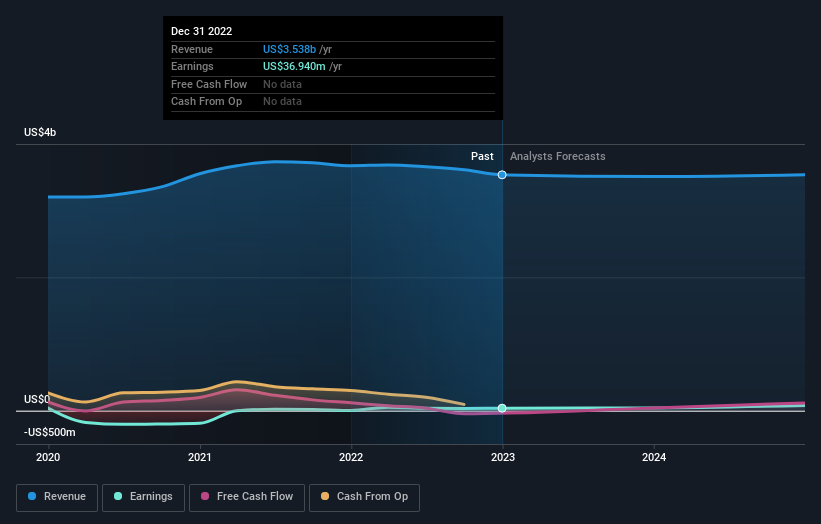- United States
- /
- Commercial Services
- /
- NYSE:PBI
Pitney Bowes Inc. Earnings Missed Analyst Estimates: Here's What Analysts Are Forecasting Now

It's been a good week for Pitney Bowes Inc. (NYSE:PBI) shareholders, because the company has just released its latest yearly results, and the shares gained 8.0% to US$4.61. It was not a great result overall. While revenues of US$3.5b were in line with analyst predictions, earnings were less than expected, missing statutory estimates by 19% to hit US$0.21 per share. The analysts typically update their forecasts at each earnings report, and we can judge from their estimates whether their view of the company has changed or if there are any new concerns to be aware of. So we collected the latest post-earnings statutory consensus estimates to see what could be in store for next year.
Check out our latest analysis for Pitney Bowes

Taking into account the latest results, Pitney Bowes' two analysts currently expect revenues in 2023 to be US$3.51b, approximately in line with the last 12 months. Statutory earnings per share are predicted to rise 8.3% to US$0.23. Before this earnings report, the analysts had been forecasting revenues of US$3.61b and earnings per share (EPS) of US$0.36 in 2023. From this we can that sentiment has definitely become more bearish after the latest results, leading to lower revenue forecasts and a large cut to earnings per share estimates.
The consensus price target fell 9.5% to US$4.75, with the weaker earnings outlook clearly leading valuation estimates.
Taking a look at the bigger picture now, one of the ways we can understand these forecasts is to see how they compare to both past performance and industry growth estimates. These estimates imply that sales are expected to slow, with a forecast annualised revenue decline of 0.7% by the end of 2023. This indicates a significant reduction from annual growth of 4.1% over the last five years. By contrast, our data suggests that other companies (with analyst coverage) in the same industry are forecast to see their revenue grow 6.8% annually for the foreseeable future. It's pretty clear that Pitney Bowes' revenues are expected to perform substantially worse than the wider industry.
The Bottom Line
The most important thing to take away is that the analysts downgraded their earnings per share estimates, showing that there has been a clear decline in sentiment following these results. Unfortunately, they also downgraded their revenue estimates, and our data indicates revenues are expected to perform worse than the wider industry. Even so, earnings per share are more important to the intrinsic value of the business. Furthermore, the analysts also cut their price targets, suggesting that the latest news has led to greater pessimism about the intrinsic value of the business.
Keeping that in mind, we still think that the longer term trajectory of the business is much more important for investors to consider. At least one analyst has provided forecasts out to 2024, which can be seen for free on our platform here.
You should always think about risks though. Case in point, we've spotted 3 warning signs for Pitney Bowes you should be aware of, and 2 of them don't sit too well with us.
If you're looking to trade Pitney Bowes, open an account with the lowest-cost platform trusted by professionals, Interactive Brokers.
With clients in over 200 countries and territories, and access to 160 markets, IBKR lets you trade stocks, options, futures, forex, bonds and funds from a single integrated account.
Enjoy no hidden fees, no account minimums, and FX conversion rates as low as 0.03%, far better than what most brokers offer.
Sponsored ContentNew: Manage All Your Stock Portfolios in One Place
We've created the ultimate portfolio companion for stock investors, and it's free.
• Connect an unlimited number of Portfolios and see your total in one currency
• Be alerted to new Warning Signs or Risks via email or mobile
• Track the Fair Value of your stocks
Have feedback on this article? Concerned about the content? Get in touch with us directly. Alternatively, email editorial-team (at) simplywallst.com.
This article by Simply Wall St is general in nature. We provide commentary based on historical data and analyst forecasts only using an unbiased methodology and our articles are not intended to be financial advice. It does not constitute a recommendation to buy or sell any stock, and does not take account of your objectives, or your financial situation. We aim to bring you long-term focused analysis driven by fundamental data. Note that our analysis may not factor in the latest price-sensitive company announcements or qualitative material. Simply Wall St has no position in any stocks mentioned.
About NYSE:PBI
Pitney Bowes
Operates as a technology-driven company that provides SaaS shipping solutions, mailing innovation, and financial services to small businesses, large enterprises, and government entities around the world.
Undervalued with moderate growth potential.
Similar Companies
Market Insights
Community Narratives



